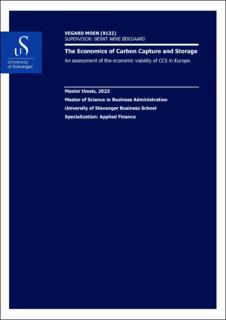| dc.description.abstract | Carbon capture and storage (CCS) is a key technology in the transition to net-zero emissions economies. By 2030, the European Union aims to capture and store at least 50 million tonnes of CO2 per year (Mtpa), and demand for CO2 storage is forecasted to be 80 Mtpa. Current all-time high cost of emitting CO2 in Europe can incentivise the commercial deployment of CCS. However, great variation and uncertainty in the cost of CCS makes its economic evaluation for industry practitioners challenging. This thesis seeks to assess the economics of CCS in Europe by quantifying its cost structure and evaluate it against policy rates for emitting CO2. The economic assessment is done through a survey of the literature on CCS and the development of a financial model for calculating CO2 transportation and storage costs. The thesis finds that the total cost of CCS across Europe’s largest emitting sectors is in the range of €91-€193 per tonne CO2 (€/tCO2) captured, transported and stored. Current carbon prices of 90 €/tCO2 enable commercial CCS, albeit on a small scale. Beyond 2030, the results suggests that CCS is viable for more than 150 million tonnes of stationary emissions. However, challenges to large-scale deployment exist and clarity in regulation and further supportive policy is necessary to realise the scale of CCS for deep decarbonisation of European economies. | |
